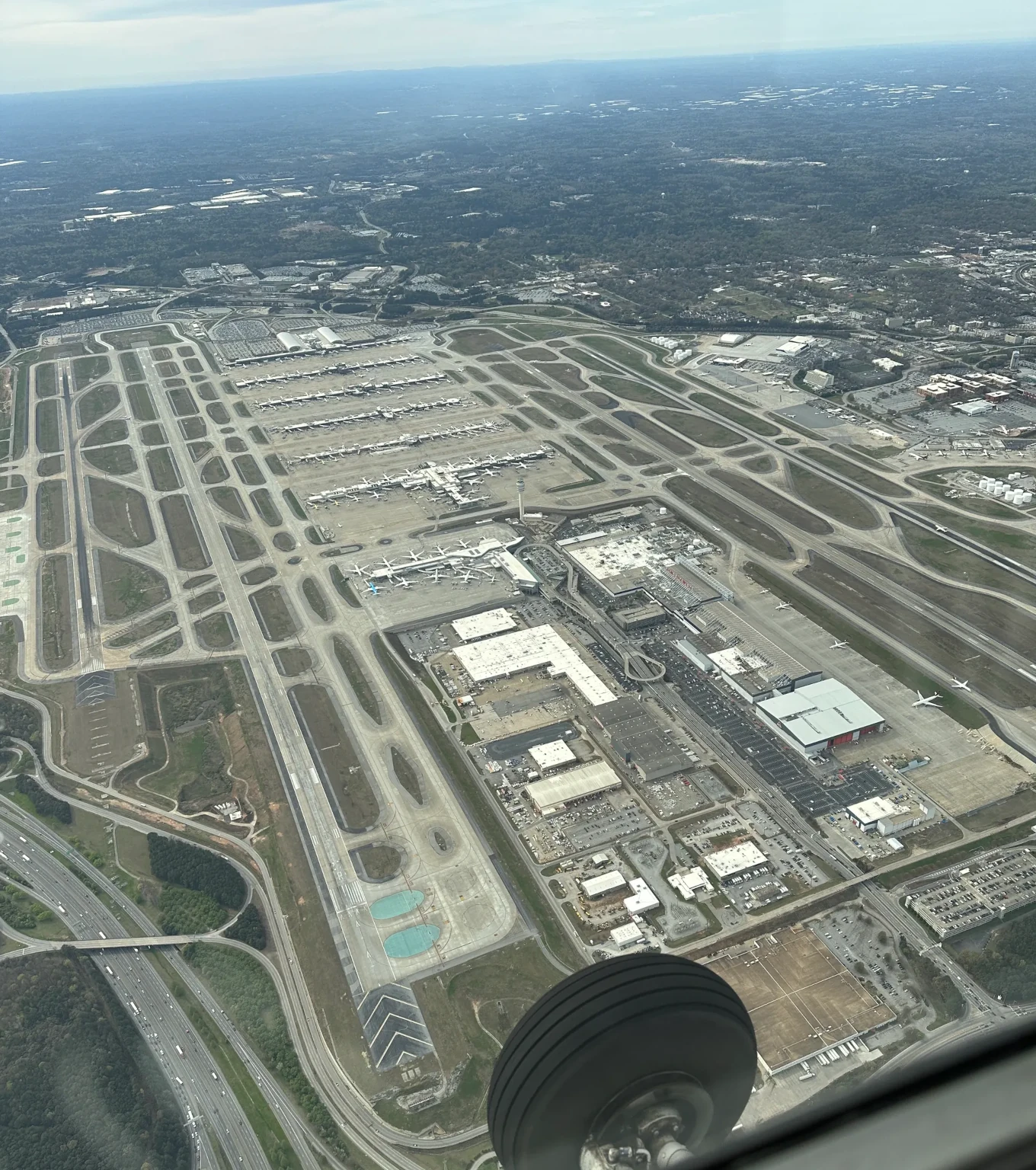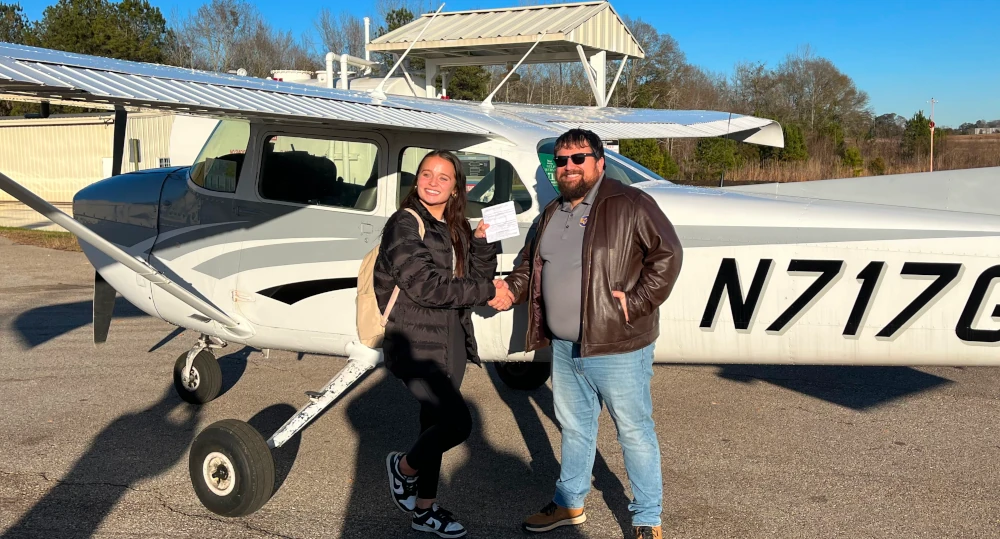How to get your private pilot certificate
Steps to become a certified pilot in the Lanett, Alabama
How to become a pilot
Private Pilot Certificate
A Private Pilot Certificate, also known as a Private Pilot License (PPL),
allows for you to be pilot in command (PIC) and carry passengers.

Private Pilot
4 Steps to Become a Private Pilot
A Private Pilot Certificate grants individuals the authority to fly aircraft for non-commercial purposes. Although this doesn't permit pilots to receive compensation for their flights or to fly for commercial purposes, a Private Pilot Certificate allows pilots to operate aircraft for leisure and personal travel.
The time required to obtain a Private Pilot Certificate typically ranges between a few months to a year, contingent upon factors such as frequency of lessons, individual aptitude, and weather conditions affecting training. It involves flying for a minimum of 40 hours which includes both solo and instructor guided flights with Blue Skies Above expert CFIs. On average, students need around 60 hours to be ready for the checkride. Additionally, candidates must pass a written exam, a flight test demonstrating their flying skills, and meet medical requirements set by the Federal Aviation Administration (FAA).
- Step 1. Discovery Flight. An introductory flight for people who are interested in flying. You fly the airplane and determine if flight training is right for you.
- Step 2. Medical Exam. Prior to flying solo, you will need to complete a medical exam by a Aviation Medical Examiner (AME) to ensure you are fit to fly.
- Step 3. Written Exam. You'll complete ground training to learn aviation theory, regulation, and weather. You'll have all the knowledge to pass your FAA written exam.
- Step 4. Flight Exam.You'll fly with your first passenger, a FAA Designated Pilot Examiner (DPE) and demonstrate you meet the requirements of the Airmen Certification Standards (ACS).
Blue Skies Above will prepare you for all of the required exams with the necessary materials and education. Give us a call and schedule a discovery flight to get started.
What Happens After the Discovery Flight?
Upon completing your introductory discovery flight, there are two possible outcomes: either you discover that aviation isn't your passion, or you find that you have a genuine interest in pursuing a future in flight. If you find that you want to become a pilot, then we'll pair you up with a Certified Flight Instructor (CFI). Together you two, along with the support of the entire Blue Skies Above team, will create a plan to complete your aviation goals successfully.
Take the first step and book a discovery flight today. You'll meet with the Blue Skies Above team, tour the classroom, and then fly a plane.
Frequently Asked
What to Expect When You First Start Flight Training

Getting started with flight training can be both exciting and challenging. We're here to guide and mentor you to become a skilled aviator.
The first thing thing we'll go over is your schedule. How many times per week are you able to dedicate to flight training? We'll then take a look at the syllabus and match the lessons to fit your schedule.
We recommend flying at least 2 to 3 times per week to optimize for retention. Flying less often means that there is a longer period where you're likely to forget things. Each flight lesson, you're relearning some of the things you may have forgotten. When you fly more frequently, you are able to solidify fundamental concepts quicker and become a better pilot.
Your initial flight lessons will focus on building a foundational understanding of aviation principles. In the classroom, you'll cover topics such as aerodynamics, navigation, and aircraft systems. Expect comprehensive lessons to lay the groundwork for your practical flying experiences.
As you progress into the practical phase of flight training, you'll spend considerable time flying the airplane. Initial flights will concentrate on flying straight and level, takeoffs, and landings. Instructors will guide you through the essential skills needed to operate an aircraft safely. Expect a structured curriculum designed to gradually increase the complexity of your flight exercises, allowing you to develop confidence and proficiency in handling various in flight scenarios.
Tips for Success
Staying consistent and having the determination to make your dreams a reality is what it takes. You consistently keep learning and developing yourself into a skilled aviator. You review your notes, study your lessons, and practice consistently so that you're ready for the next lesson each time.
Ask questions. Discuss with your CFI concepts that you don't fully understand.
Have fun and enjoy flying the Blue Skies Above.

Become a pilot at Blue Skies Above
Our flight school welcomes aviators to Lanett, Alabama. The process is simple and only takes 3 steps to get started.
-
1. Meet The Team
-
Get in touch with a Blue Skies Team member. We'll learn what your aviation goals are and discuss how we can help reach those goals.
-
2. Visit Blue Skies Above
-
Visit our flight school and see our planes. Fly with one of our CFIs to start training and flying planes at Blue Skies Above.
-
3. Start Flying
-
Whether you're flying for a career or flying for fun, Blue Skies Above will help you acquire the skills and knowledge to become a safe proficient pilot.
We are the flight training experts in Lanett, AL
As the only flight school with a Cessna fleet in the area, we pride ourselves in training safe and highly proficient pilots. Come see what everyone's talking about! Visit Blue Skies Above and begin flight training today.